Men in white fur caps proudly ride horses across the steppe, rows of modern machinery glisten, Barbie-pink flamingos strut before clear blue skies and a white yacht cuts through the turquoise waters of the Caspian Sea.
These are idyllic scenes from a one-minute video promoting the inaugural Caspian Economic Forum, which between August 11 and 12 will see heads of state from Iran, Russia, Azerbaijan and Kazakhstan descend on Awaza, a new resort town that has been touted by Turkmenistan’s Foreign Ministry as the country’s Las Vegas.
The footage paints the picture of a happy, prosperous nation.
But the reality for the 5.85 million people who live in this authoritarian hermit nation is different.
Strict media controls mean that information trickles out of the country, but human rights abuses are commonplace, activists often disappear, and forced labor is a concern, according to Human Rights Watch.
As a hermit nation, it rivals North Korea. Just over 6,000 people visited Turkmenistan in 2016, according to local media reports. Entry visas are notoriously hard to obtain. Awaza lies empty most of the year.
For years, Turkmenistan has been able to survive on its vast gas reserves. But with the collapse of gas prices in recent years, the screws are tightening – a recent report by British think tank, The Foreign Policy Centre, suggests the Central Asian nation is now on the brink of collapse.
“There is not enough food in the state-run shops so every morning people have to line up for hours to buy such staples as flour, bread or sugar,” says Ruslan Myatiev, who runs independent news site Turkmen.news from the Netherlands, and gets his information from a network of local informants.
Adding to the economic woes, the country’s despotic leader, Gurbanguly Berdymukhamedov, has been conspicuously absent since mid-July, appearing just three times on state media, which once reported almost daily on the President’s activities.
As the Caspian Economic Forum kicks off this week, critics will be wondering whether Turkmenistan’s leader will appear in person, just as the country faces unprecedented headwinds.
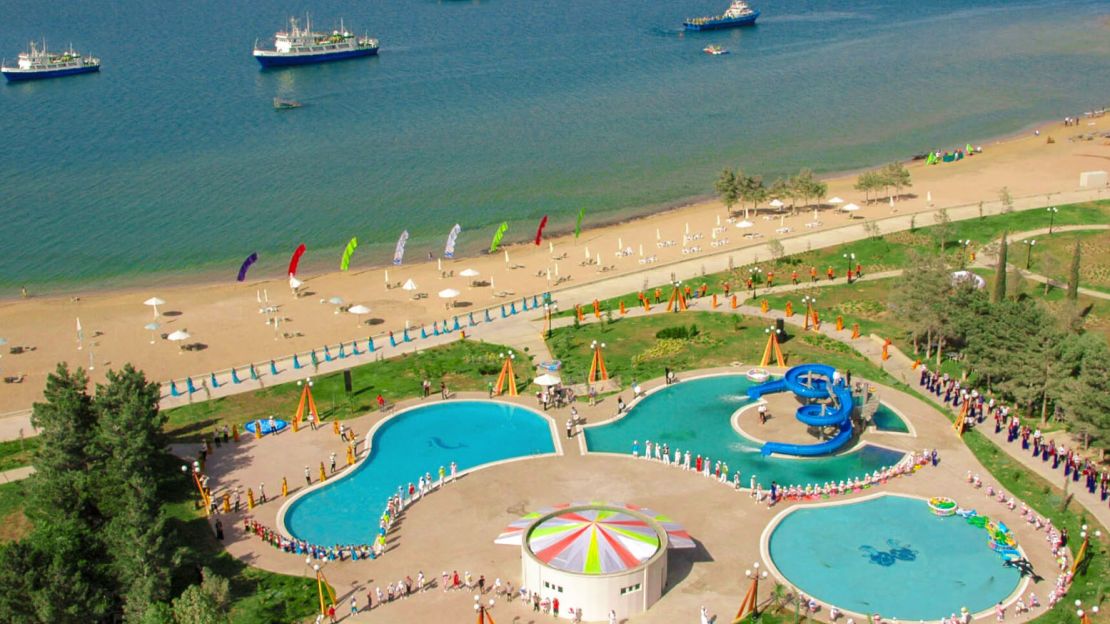
A hermit nation
When it gained independence from the USSR in 1991, Turkmenistan was a land dominated by pastoral tribes with different ethnic backgrounds.
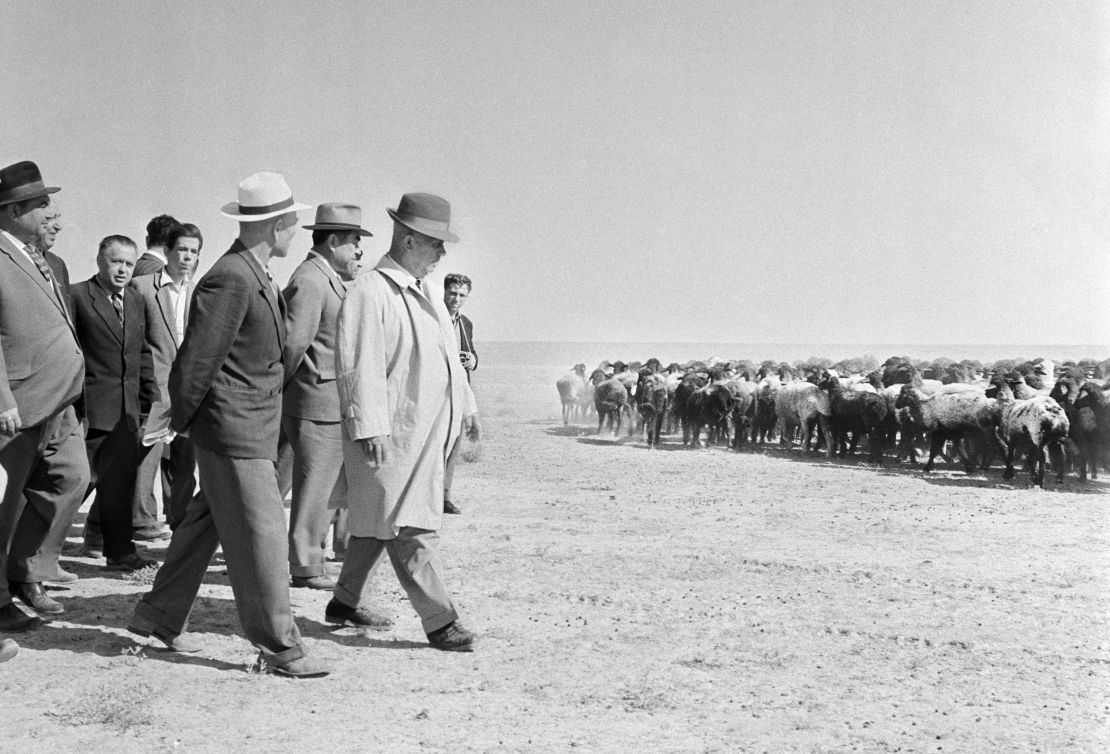
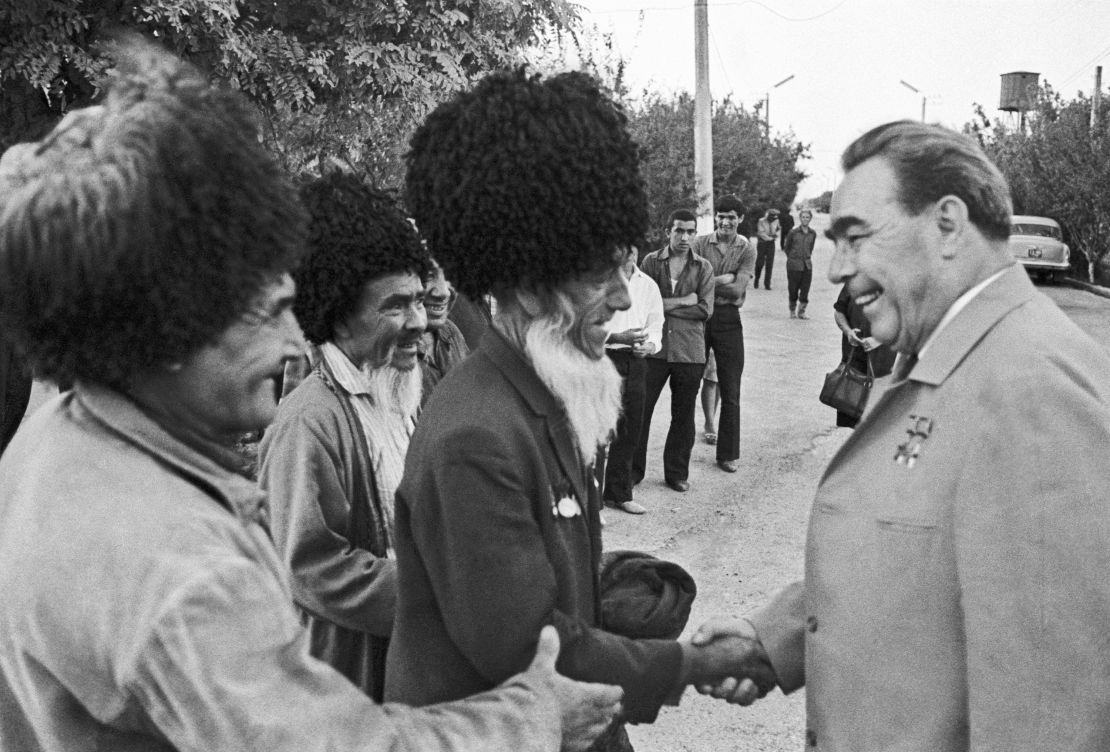
President Saparmurat Niyazov, an ex-Soviet apparatchik, set about creating a national identity for his country, “inextricably weaving it around his own personality and presenting himself as the embodiment of those national ideals,” according to The Foreign Policy Centre report.
In 2001, Niyazov wrote a revisionist history of the country called “The Ruhnama” (meaning “The Book of Soul”), which schoolchildren and civil servants had to learn by heart. In the capital city Ashgabat, a giant mechanical monument of the book painted in gaudy colors opens at 8 p.m. each night with a light display and plays audio of a passage from the text.
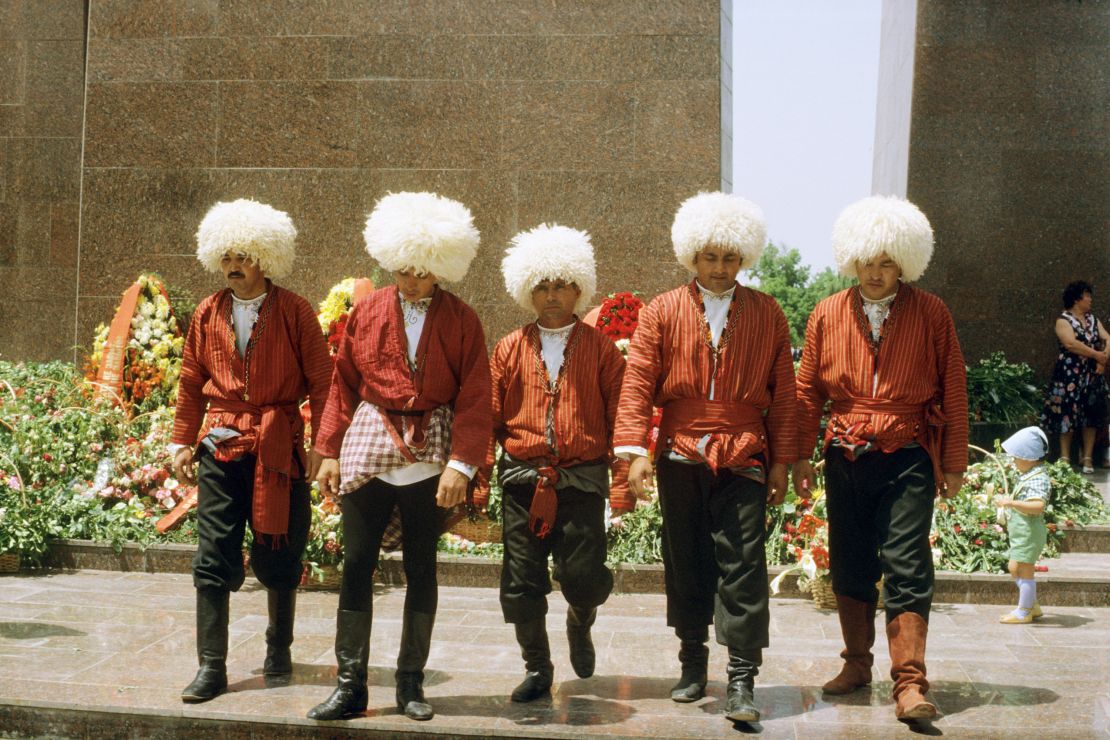
Turkmenistan’s first President also built a $50 million amusement park in the city based on local folklore and renamed the months of the year after historical figures, such as the poet Magtymguly, the semi-mythological founder of the Turkmen nation Oguz, as well as after himself and his mother.
He also built a giant golden statue of himself in Ashgabat, which rotates to always face the sun. For reasons that remain unclear, the first Turkmen President banned ballet, opera and golden teeth.
Niyazov presided over the golden years when gas prices were high and Russia was paying for the country’s resources in cash. But he failed to diversify the economy. When he died in 2006, Gurbanguly Berdymukhamedov, a dentist by trade and the former minister of health, was chosen to succeed him.
“One personality cult was replaced by another,” says Ruslan Tuhbatullin, who edits the news publication the Chronicles of Turkmenistan from his base in Vienna, Austria.
In 2012, Berdymukhamedov introduced multiparty elections, but the last time Turkmenistan went to the polls, in 2017, the President was reelected with 98% of the vote. Turkmenistan also has an elected Parliament, but it is staffed by parties loyal to the President.
State media likes to portray the 52-year-old President as a super-human figure with a seemingly endless array of talents. He is often shown riding horses, DJing, strumming his guitar with his grandson, playing with kittens or weightlifting a gold bar during ministerial meetings. Berdymukhamedov has also supposedly written more than 40 books on topics such as tea, herbal medicine and horses, according to the Chronicles of Turkmenistan.
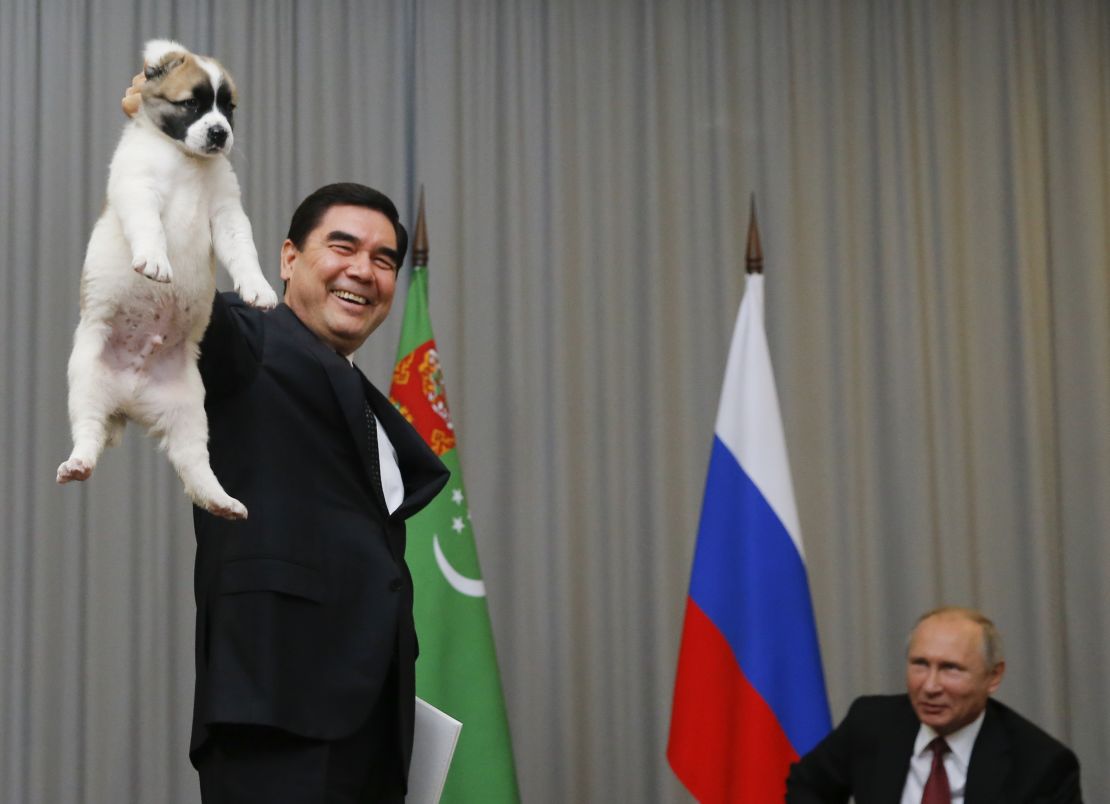
In Ashgabat, he went on a building spree, transforming the sleepy capital into a glitzy showpiece that belies the country’s dire economic situation. A French expat, who spent a year living in Ashgabat in 2013 working for a construction company, and wishes to remain anonymous, remembers “a city covered in white marble, with no foreign brands, huge empty theaters and portraits of the President on every street corner.” In recent years, a $2.3 billion airport shaped like a bird has been built, along with a $5 billion so-called “Olympic village” for the 2017 Asian Indoor and Martial Arts Games.
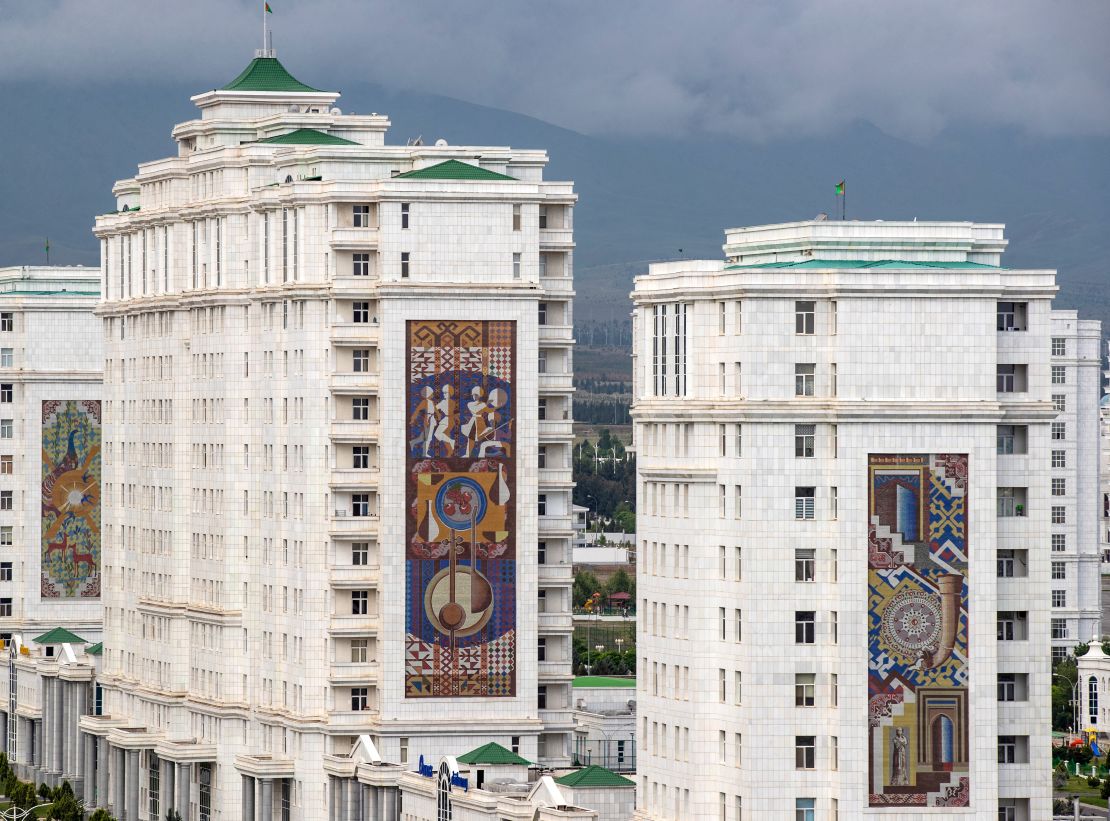
“Niyazov was a product of the Soviet system and, as such, he governed alone, relying on law enforcement agencies,” says Bayram Shikhmuradov, editor of the news platform Gundogar, which operates out of Dubai. Since taking power, Berdymukhamedov has surrounded himself with family members and powerful businessmen.
“Corruption is an endemic feature of Turkmenistan’s economic life,” writes The Foreign Policy Centre in its report, adding that “family ties and political loyalty are the main factors that determine the awarding of contracts.” In 2018, Transparency International ranked it 161 out of 179 countries in its Corruption Perceptions Index.
Silencing critics
In this oppressive climate, dissent is not tolerated.
“There are curfews at night and restrictions around celebrations during Ramadan to prevent large gatherings,” says Adam Hug, who authored the Foreign Policy Centre’s report.
There is no independent media and most foreign websites are blocked, according to the independent watchdog group Freedom House.
“People install satellite dishes to watch Russian or Turkish television channels or use VPNs to get around the censorship online, but the government has recently cracked down on these,” says Tuhbatullin.
Those who dare to speak up are often arrested.
Journalist Saparmamed Nepeskuliev was sentenced to three years in prison in 2015 for drug trafficking after reporting on water shortages. He says drugs were planted on him. “On the day of my lawsuit, no one was allowed in the court room, not even my lawyer,” he recalls.
Reporters Without Borders ranks Turkmenistan as the worst country in the world for press freedom, ahead ofNorth Korea.
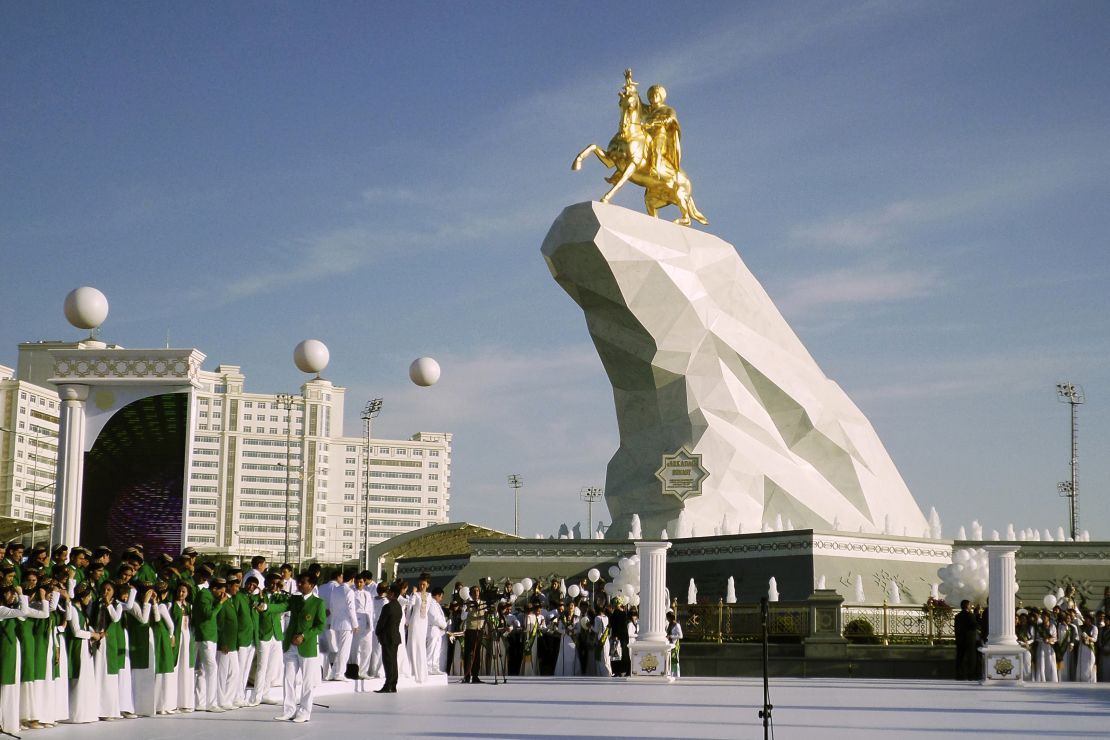
In prison, critics of the regime face torture. “They are put into cells which can reach 50 degrees in summer and -20 in winter, not given enough food and often held in solitary confinement,” says Shikhmuradov, whose father – an ex-foreign affairs minister accused of planning a coup – was arrested in 2002 and never seen again. According to the NGO Prove They Are Alive, at least 121 Turkmen have disappeared in the country’s jail system.
Nepeskuliev says he was beaten every day for several months in detention. “Six or seven people would walk on my hands, hit my legs, slap my face,” he says. “My legs were broken and I lost a tooth.” Soon, he was no longer able to stand up. “I had to crawl on all fours,” he says. He started a hunger strike. But the prison guards cut off his supply of water to punish him. “I had to lick the tap to get a few drops of moisture,” he remembers.
The Turkmen Foreign Ministry didn’t respond to CNN requests for comment regarding allegations that the government is responsible for human rights abuses and forced labor in Turkmenistan.
At one point, he weighed only 37 kilograms, dangerously underweight for man 180 centimeters (5 foot 10 inches) tall. “I was on the brink of death,” says the journalist, who fled the country in 2019 after his release and now lives in an undisclosed location.
There are also multiple reports of forced labor in Turkmenistan. “Every year, the state allocates a certain production target to each cotton growing region,” says Myatiev, from Turkmen.news. “This is then parceled out among all the schools, hospitals and state-owned enterprises, and their employees are sent into the fields to pick the cotton. They are given daily quotas, such as 50 kilos per person.”
This is dangerous work. “They use their bare hands, exposing themselves to the chemicals used to grow the cotton and to kill off the leaves just before harvest,” he adds. At times, children have been sent to the fields. In 2018, the US government banned the import of goods made from Turkmen cotton after complaints about forced labor, and, as of July 2019, 70 companies, including Gap, H&M and Levi’s, had pledged to stop using it.
‘Some people are going hungry’
None of this will be on display when foreign officials gather this week to discuss business opportunities on the shores of the Caspian. Panels at the forum will focus on oil and gas exploration. “Turkmenistan’s economy is entirely reliant on gas exports, which represent its only significant source of revenue,” says Luca Anceschi, an expert on Central Asia at the University of Glasgow.
At the end of 2018, the country possessed about 10% of all proven natural gas reserves, amounting to 19.5 trillion cubic meters, according to BP. For the first 25 years of independence, Russia was Turkmenistan’s largest customer, alongside a few minor gas swap deals with Iran, adds the academic. But in 2016, Gazprom stopped purchasing Turkmen gas following a price dispute and imports to China soared.
At first, Turkmenistan thought it had struck gold. Between 2010 and 2018, gas trade between the two countries increased tenfold, according to Anceschi’s research. In 2018, Beijing bought nearly 95% of Turkmenistan’s gas, according to BP’s statistics.
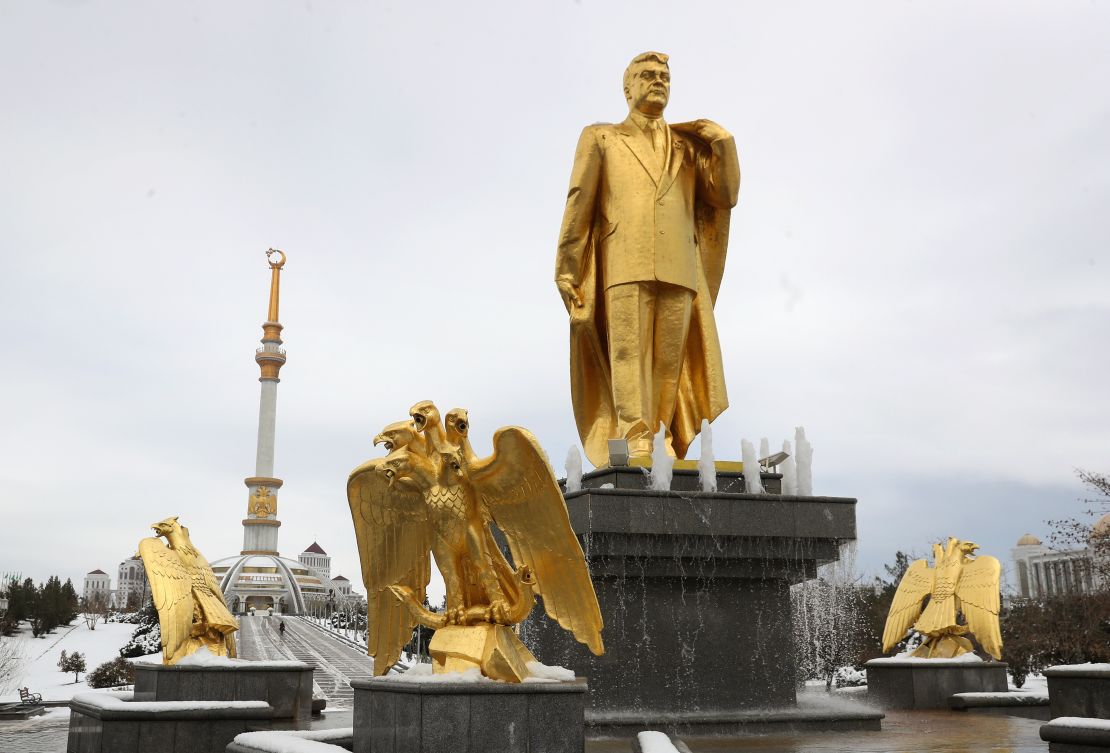
“But China isn’t paying for it in hard cash,” says Anceschi. As part of the Belt & Road initiative, the state-owned company China National Petroleum Company developed the Galkynysh gas field and built the pipeline used to ship gas to China. Turkmenistan footed the bill, with the help of Chinese loans amounting to $10 billion, according to a report by the Center for Strategic and International Studies, an American think tank.
“Much of the revenue generated by the sale of gas is now being used to service and pay for this debt,” explains Anceschi.
The collapse of the price of gas, which went from $350 to $185 per 1,000 cubic meters between 2014 and 2017 hasn’t helped. “Turkmenistan now sorely lacks cash to pay for its imports,” says Adam Hug. Up until recently, the country had been importing large quantities of wheat, which is a staple of local diets, from Kazakhstan. These woes have been compounded by poor harvests within Turkmenistan. The government sets quotas for each crop.
“Last year, only 50% of the planned amount of cotton and wheat were gathered,” says Tuhbatullin, who gets his information from sources on the ground, including within the government. The shortfall was due to droughts in some parts of the country and heavy rains in others, according to the Food and Agriculture Organization of the United Nations.
This has led to food shortages and long lines in front of state owned shops, starting in late 2017. In Ashgabat, the capital, each family is now allowed only one kilogram of flour; in Dashoguz, a city in the north, customers can purchase up to 5 kilograms, according to reports by Turkmen.news and Radio Azatlyk.
“There is no widespread famine at this point, but some people are going hungry,” says Myatiev, from Turkmen.news. “Many families are also having to survive on cheap foodstuffs, such as macaroni and bread, as they can no longer afford fruits and vegetables.”
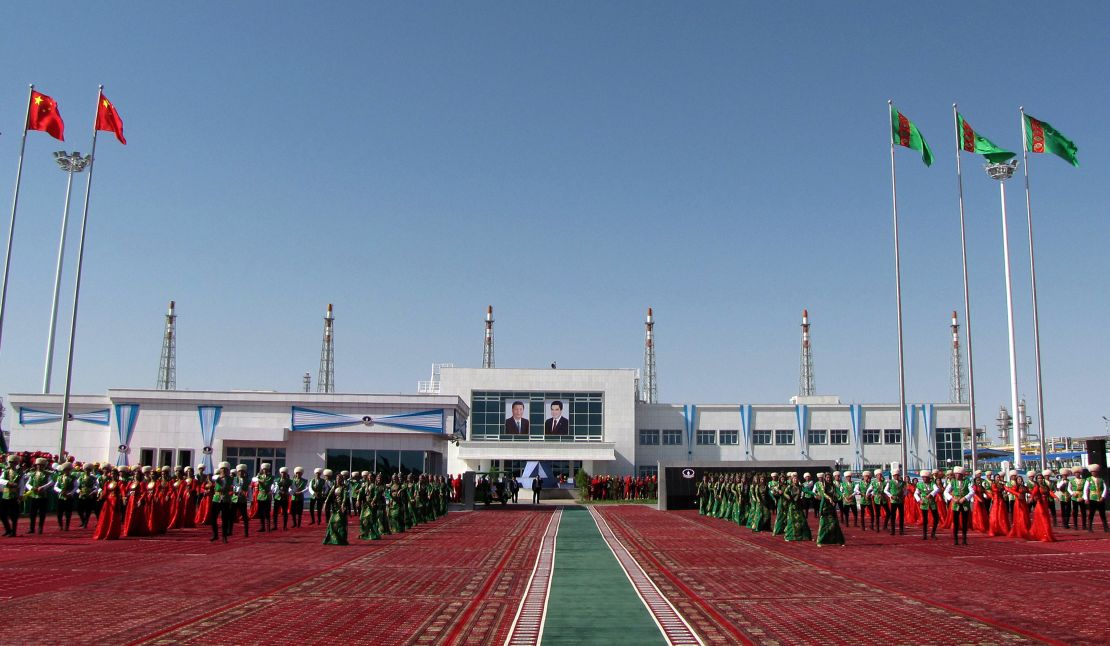
Some people are so desperate they are buying soap and detergent in Turkmenistan and reselling it across the border in Uzbekistan for a small profit, he adds.
Unemployment has also surged. State-owned companies and administrations have been laying off workers on a massive scale in the past couple of years, according to The Foreign Policy Center. In early 2019, short on cash, the state scrapped its generous subsidies for water, electricity and gas, which had long been used as a tool to quell dissent.
Where is the President?
Berdymukhamedov is known as Arkadag or “the protector.” But in recent weeks there has been wild speculation about his well-being.
The president’s whereabouts are normally a daily fixture on the evening news bulletin, but since July 5 he has only appeared in state media three times.
The most recent video, broadcast on August 4, appeared to be an attempt to show the President was well and had merely been enjoying a summer holiday.
The extended clip showed the President bowling, riding a horse, recording a new song and driving an off-road vehicle near a burning pit of gas, but skeptics point out that none of the images were dated.
The death rumors date back to May when the Chronicles of Turkmenistan reported that a team of doctors was urgently flown in to the Central Asian country from Turkey. Some speculated Berdymukhamedov could have succumbed to kidney failure.
Their suspicions appeared to be confirmed when state media reported that the whole government was put on vacation from July 15 to August 15, despite those dates overlapping with the Caspian Economic Forum on August 11 and 12.
A representative from the Turkmen Embassy in Russia has vehemently denied rumors the President is unwell.
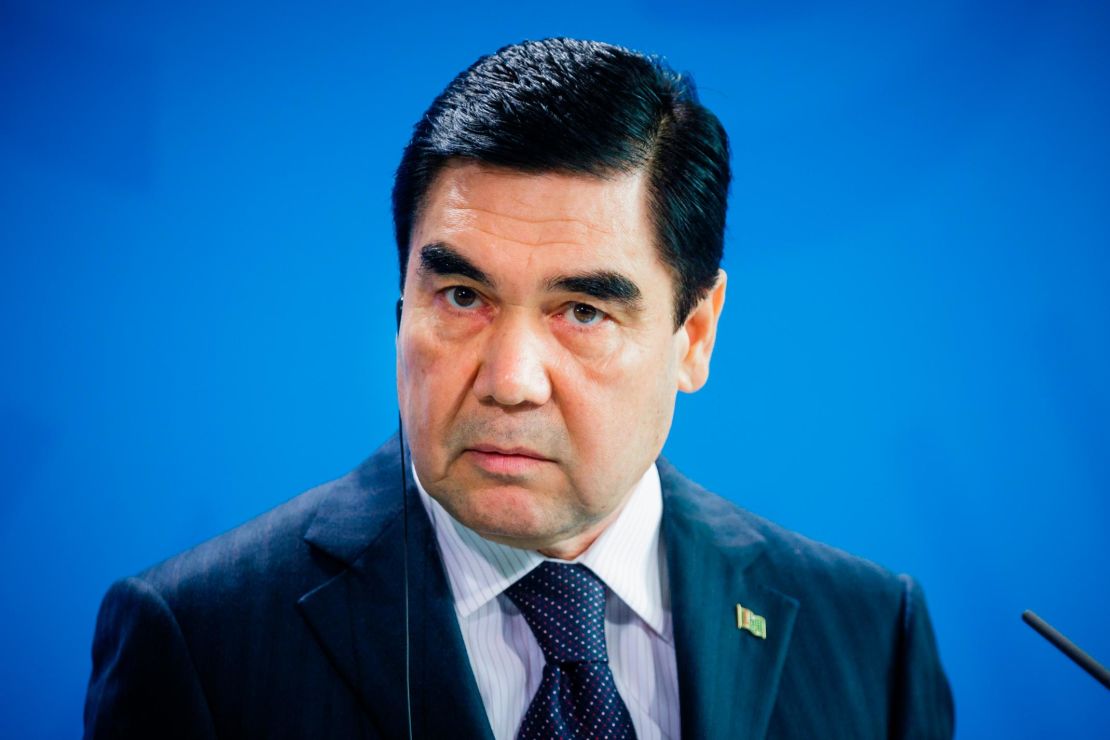
Officials from Tashkent have also said that Berdymukhamedov called Uzbek President Shavkat Mirziyoev to congratulate him on his birthday on July 24.
And Russian Prime Minister Dmitry Medvedev is set to meet him during the Caspian Economic Forum, according to the Russian government press service.
Very little information about the forum’s content has filtered through. As of early August, its official website had been inaccessible for over a week. As the event kicks off on August 11, onlookers will be closely watching for clues about the future of this secretive country.
CNN’s Olga Pavlova and Zahra Ullah also contributed to this report.
